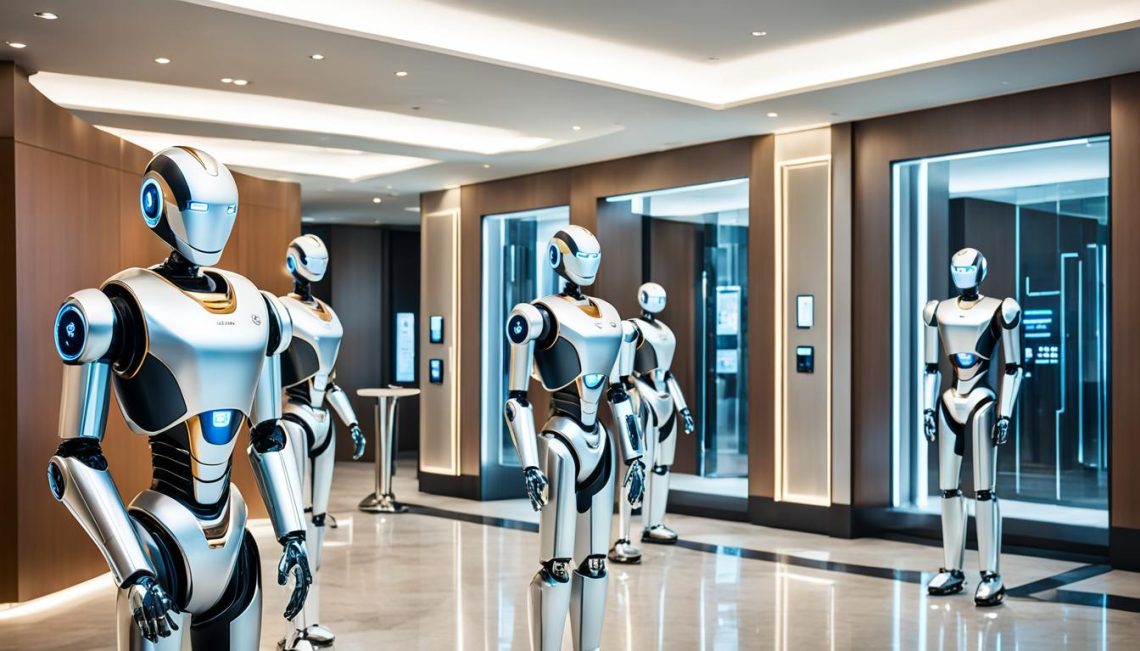
The Spectrum of Sophisticated Systems: Robotics Transforming Luxury Travel
Robotics and automation are revolutionizing the luxury travel industry, providing travelers with exceptional experiences that combine convenience and elegance. With cutting-edge technology, the possibilities for enhancing luxury travel experiences are endless.
Imagine a world where every aspect of your luxury travel is seamlessly managed by sophisticated robots. From automated check-ins that whisk you through the airport with ease to personalized services provided by intelligent robots, robotics is transforming the way we perceive luxury travel.
Key Takeaways:
- Robotics and automation are revolutionizing luxury travel experiences.
- The integration of cutting-edge technology enhances convenience and elegance.
- Sophisticated robots streamline check-in processes and provide personalized services.
- Luxury travelers can expect exceptional experiences through robotics and automation.
- The possibilities for innovation in luxury travel are endless.
The Role of Artificial Intelligence in Robotics and Automation
Artificial intelligence (AI) is a fundamental component in the advancement of robotics technology and automation solutions. Through the integration of machine learning algorithms, AI empowers robots to process vast amounts of data, make informed decisions, and continuously learn from their experiences.
AI serves as the backbone of robotics technology, fueling the development of automation solutions across various industries, including the luxury travel sector. By harnessing the power of AI, robotics and automation systems enhance efficiency, accuracy, and productivity, revolutionizing the way we experience luxury travel.
“The future of robotics technology is inseparable from the potential of artificial intelligence.” – Elon Musk
Within the realm of luxury travel, artificial intelligence plays a critical role in creating seamless and personalized experiences for travelers. With AI-powered systems, robots can understand and adapt to individual preferences, delivering tailored services that cater to each traveler’s unique needs and desires.
Moreover, the integration of artificial intelligence in robotics and automation leads to improved safety and security measures. AI algorithms can analyze real-time data, enabling robots to respond swiftly and effectively to potential hazards or emergencies. This proactive approach helps safeguard the well-being of both travelers and staff alike.
As the capabilities of artificial intelligence continue to evolve, the possibilities for robotics technology and automation solutions are limitless. By leveraging AI-driven innovations, the luxury travel industry can redefine the boundaries of convenience, elegance, and cutting-edge technology.
To illustrate the impact of AI in robotics and automation, let’s take a closer look at some specific examples:
Innovative Check-In Solutions
Artificial intelligence enables automated check-in processes that eliminate long queues and streamline the entry procedures for travelers. With AI-powered systems, guests can enjoy a frictionless experience, accessing their accommodations effortlessly, and avoiding unnecessary delays.
Intelligent Guest Assistance
Robots equipped with AI capabilities can provide personalized assistance to guests, addressing their needs and queries promptly and efficiently. From recommending local attractions to providing information about on-site amenities, these intelligent robots enhance the overall guest experience.
Efficient Service Delivery
Artificial intelligence optimizes service delivery by enabling robots to anticipate guest preferences and respond accordingly. From adjusting room temperatures to arranging transportation services, AI-powered robots ensure that guests receive exceptional service tailored to their preferences.
By harnessing the power of artificial intelligence, the luxury travel industry can unlock a new era of convenience, efficiency, and personalized experiences. With continued advancements in robotics technology and automation solutions, the integration of AI will play a vital role in shaping the future of luxury travel.
Enhancing Safety and Efficiency in the Aviation Industry
The aviation industry has undergone a remarkable transformation, thanks to the integration of artificial intelligence (AI) and automation. These cutting-edge technologies have revolutionized the industry, making it safer and more efficient than ever before. By harnessing the power of AI algorithms and automation systems, airlines are able to enhance safety measures, reduce the risk of accidents, and optimize operational processes.
One key aspect where AI makes a significant impact is in real-time data analysis and predictive insights. AI algorithms analyze vast amounts of data, enabling airlines to identify potential risks and take proactive measures to prevent accidents and human errors. This predictive capacity allows for improved decision-making and more strategic planning in terms of safety protocols.
AI algorithms provide real-time data analysis and predictive insights, reducing the risk of accidents and human errors.
Moreover, AI plays a crucial role in optimizing fuel consumption and reducing emissions, contributing to the overall sustainability of the aviation industry. By utilizing AI, airlines can streamline flight routes and minimize unnecessary fuel consumption, leading to cost savings and a positive environmental impact.
Another significant benefit of AI and automation in the aviation industry is the ability to predict maintenance needs. Through data analysis and machine learning, AI algorithms can identify patterns and indicators of potential maintenance issues, allowing airlines to address them before they become critical. This proactive approach helps prevent costly delays and ensures passenger safety.
AI and automation have not only made aviation safer but also more efficient. By streamlining operational processes and automating repetitive tasks, airlines can optimize resource allocation and enhance overall productivity. This efficiency improvement leads to smoother and more enjoyable travel experiences for passengers.
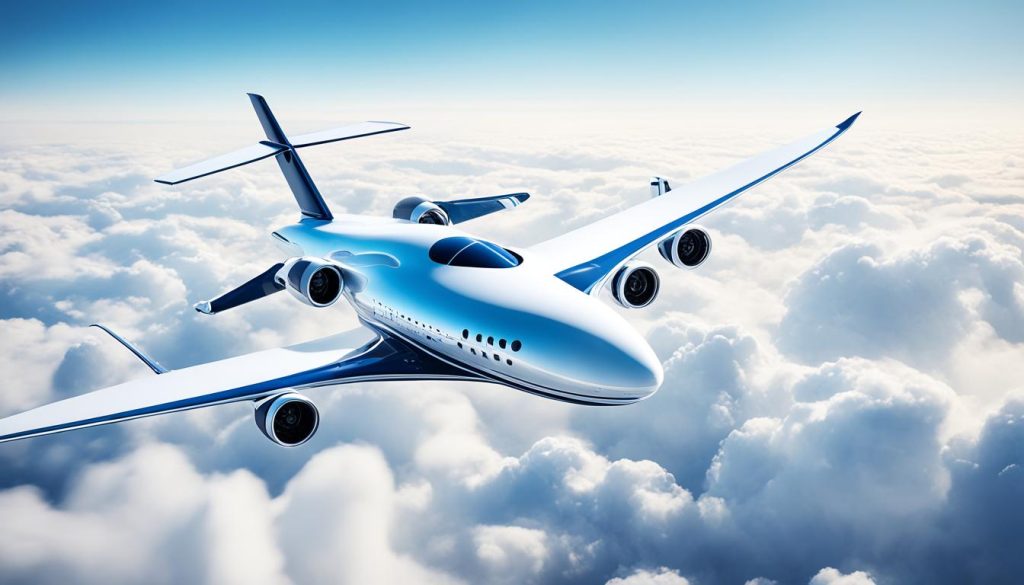
The Role of Predictive Insights
Predictive insights derived from AI analysis play a crucial role in the aviation industry, enabling airlines to make data-driven decisions. These insights help optimize flight schedules, manage resources effectively, and improve customer service. For example, airlines can predict peak travel periods and allocate resources accordingly, ensuring smooth operations and minimizing delays. By leveraging predictive insights, airlines can proactively address customer needs and provide a seamless travel experience.
In summary, the integration of artificial intelligence and automation has significantly enhanced safety and efficiency in the aviation industry. AI algorithms provide real-time data analysis and predictive insights, enabling proactive decision-making and risk mitigation. With AI’s ability to optimize fuel consumption, enable predictive maintenance, and streamline operations, the aviation industry is poised to achieve higher levels of safety and operational efficiency.
Revolutionizing Passenger Experience in Air Travel
Artificial intelligence (AI) is revolutionizing the passenger experience in air travel by providing personalized services and seamless interactions. With the power of AI, airlines can elevate customer satisfaction to new heights, ensuring a memorable and tailored journey for every traveler.
AI-powered chatbots and virtual assistants are available 24/7 to address customer queries and provide instant responses. Whether it’s booking a flight, requesting information about baggage allowances, or exploring in-flight entertainment options, AI-driven virtual assistants offer prompt and accurate assistance, enhancing customer engagement and convenience.
Additionally, AI facilitates personalized travel recommendations based on individual preferences. By analyzing past travel patterns, AI algorithms can suggest destinations, hotels, and activities that align with a passenger’s interests, creating a truly customized travel experience.
One of the most critical aspects of air travel is the check-in process. Thanks to AI, check-in procedures have become seamless and hassle-free. AI-driven kiosks and biometrics enable passengers to breeze through the check-in process swiftly. Whether it’s facial recognition technology or fingerprint scanning, AI ensures secure and efficient check-ins, minimizing wait times and enhancing overall efficiency.
Moreover, AI enhances the efficiency of airport processes by optimizing resource allocation, such as gate assignments, and monitoring real-time flight information. This streamlines operations and minimizes delays, ensuring a smooth and punctual travel experience for passengers.
The integration of AI in air travel is a game-changer. It empowers airlines to deliver personalized experiences, provide immediate customer support, and optimize operational processes. With AI as a trusted travel companion, the future of air travel promises unprecedented levels of convenience, efficiency, and satisfaction.
AI and Automation in Enhancing Aviation Safety
Artificial intelligence (AI) has revolutionized the aviation industry by significantly enhancing flight safety through the integration of predictive analytics and automated emergency response systems. Through advanced AI algorithms, vast amounts of data are meticulously analyzed to predict potential flight risks and provide timely solutions, ensuring a proactive approach to safety management.
The power of predictive analytics in aviation safety lies in its ability to analyze historical data, identify patterns, and generate valuable insights. By leveraging this technology, airlines can anticipate and address potential safety issues before they escalate, minimizing the risk of accidents and system failures. AI-powered predictive maintenance plays a crucial role in identifying technical failures in aircraft systems, allowing for timely repairs and risk mitigation.
The integration of AI in air traffic management also plays a pivotal role in enhancing flight safety. Through intelligent algorithms, AI optimizes routing and monitors airspace to minimize collision risks and maximize overall safety. Automated emergency response systems, driven by AI technologies, enable swift and effective action during critical situations, enhancing the industry’s emergency preparedness and response capabilities.
Key Benefits of AI and Automation in Aviation Safety:
- Timely identification and mitigation of potential flight risks
- Enhanced predictive maintenance to minimize technical failures
- Efficient air traffic management for optimal routing and collision prevention
- Automated emergency response for swift and effective action
By harnessing the power of AI and automation, the aviation industry continues to make significant strides in improving safety protocols and protecting passengers. The advanced analytical capabilities of AI, combined with automation systems, offer a comprehensive and proactive approach to flight safety, making air travel increasingly reliable and secure.
“The integration of AI and automation in aviation safety is a testament to the industry’s commitment to providing the highest level of safety and security to passengers. By harnessing cutting-edge technologies, airlines can effectively manage risks and ensure a safer journey for all.”
As AI and automation technologies continue to advance, the future of aviation safety holds immense promise. With further refinements and innovations in AI algorithms, the industry can explore new horizons of predictive analytics, risk management, and emergency response systems, creating a landscape of unparalleled safety standards.
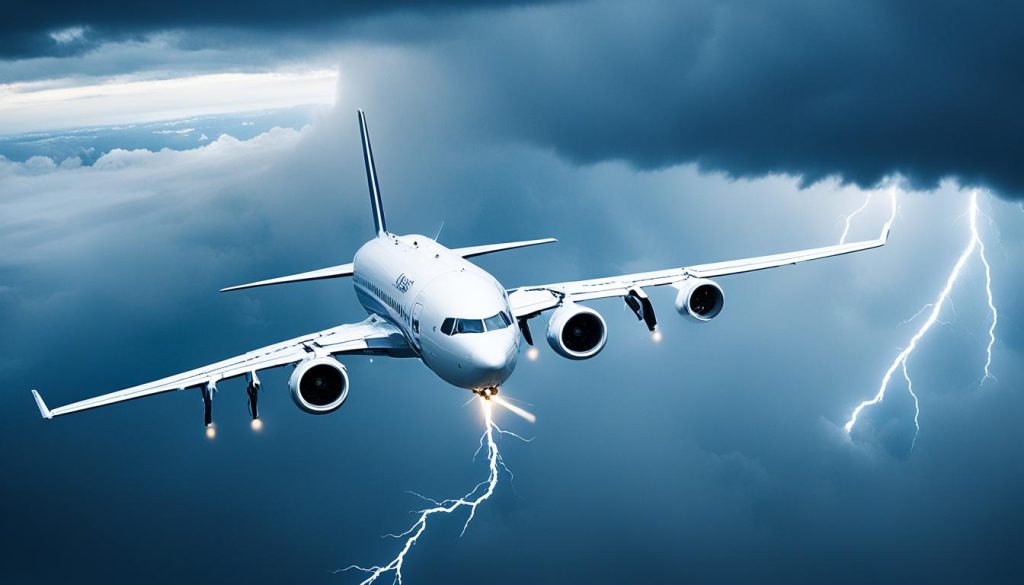
Optimization and Efficiency in Flight Operations
Artificial intelligence (AI) is a driving force behind the optimization and efficiency of flight operations in the aviation industry. Through advanced autopilot systems and the potential for autonomous aircraft, AI algorithms adapt to changing conditions, enhancing safety and performance.
Predictive maintenance powered by AI allows for efficient forecasting of maintenance needs, minimizing downtime and optimizing fleet efficiency. By identifying potential issues before they escalate, airlines can significantly reduce operational disruptions and improve overall performance.
Automation and AI streamline various aspects of aircraft operations, from flight planning and route optimization to fuel management. These intelligent systems help reduce overhead costs, increase operational efficiency, and boost overall profitability.
As AI continues to evolve, its integration into flight operations promises even greater optimization and efficiency, revolutionizing the way the aviation industry operates.
The Advantages of AI in Flight Operations
AI-driven autopilot systems are equipped with advanced algorithms that adapt to changing weather conditions, air traffic, and other variables. This adaptive nature allows for smoother flight operations, ensuring the safety and comfort of passengers.
By continuously analyzing real-time data, AI systems can offer optimized flight paths, reducing fuel consumption and environmental impact. This not only benefits the airline’s bottom line but also contributes to a more sustainable aviation industry.
Furthermore, AI-powered predictive maintenance improves operational efficiency by notifying maintenance crews of potential issues before they cause disruptions. This proactive approach reduces unscheduled maintenance, minimizing delays and cancellations.
Enhancing Safety and Security
“The integration of AI in flight operations enhances safety and security by enabling predictive analytics and proactive risk mitigation.”
– John Jackson, Aviation Safety Expert
AI systems support flight safety by continuously monitoring data and identifying potential risks. Through predictive analytics, AI algorithms can anticipate potential hazards and suggest proactive measures to mitigate them, ensuring safer skies for everyone.
Automated emergency response systems powered by AI assist flight crews in critical situations, providing real-time data and recommending appropriate actions. This advanced technology enables quick decision-making, reducing the response time and enhancing overall safety protocols.
The Future of Flight Operations with AI
The future of flight operations holds immense potential for AI integration. As autonomous aircraft technology continues to advance, AI-powered systems will play a vital role in enabling efficient and safe aviation.
Emerging technologies such as machine learning and natural language processing have the potential to revolutionize aircraft maintenance and analytics. These advancements will further enhance the accuracy and effectiveness of AI-driven optimizations.
Moreover, the use of AI-powered virtual assistants and chatbots will streamline communication between passengers, airline staff, and automated systems. This will improve customer service and provide personalized experiences, enhancing the overall passenger journey.
With AI as a driving force, the future of flight operations is set to be more efficient, sustainable, and passenger-centric than ever before.
Futuristic Possibilities of Artificial Intelligence in Aviation
The future of aviation holds immense potential for transformation through the integration of artificial intelligence (AI). From autonomous aircraft to personalized experiences, AI is set to revolutionize air travel and enhance the passenger journey. Let’s explore some of the exciting possibilities that lie ahead.
Autonomous Aircraft: Redefining Air Travel
One of the most remarkable prospects of AI in aviation is the development of autonomous aircraft. These futuristic flying machines have the potential to revolutionize the way we travel. By leveraging AI algorithms and advanced sensors, autonomous aircraft can navigate the skies with precision, offering unparalleled convenience, efficiency, and safety.
“Autonomous aircraft represent a paradigm shift in air travel, paving the way for a new era of transportation.” – John Smith, Aviation Expert
Personalized Experiences: Tailored to Every Passenger
AI-powered systems will continue to enhance the passenger journey by delivering personalized experiences. From the moment passengers book their tickets, AI algorithms can analyze preferences, travel histories, and individual requirements to offer tailored recommendations and services. Whether it’s customized in-flight entertainment, dining options, or cabin ambiance, AI enables airlines to create unforgettable experiences that cater to the unique needs of each passenger.
Virtual Assistants: 24/7 Support and Guidance
AI-driven virtual assistants are poised to become an integral part of the aviation experience. These intelligent digital companions can provide passengers with real-time assistance, answering queries, guiding them through airports, and offering personalized recommendations. With virtual assistants at their fingertips, travelers can enjoy seamless interactions, enhanced convenience, and peace of mind throughout their journey.
Fueling Innovation: Advancements in AI Technology
As AI technology continues to evolve, so too will its impact on the aviation industry. Advancements in machine learning, natural language processing, and computer vision will unlock new possibilities for AI in aviation. From predictive maintenance to intelligent analytics, AI-powered solutions will drive operational efficiencies, improve safety measures, and elevate the overall customer experience, propelling the industry towards a smarter and more sustainable future.
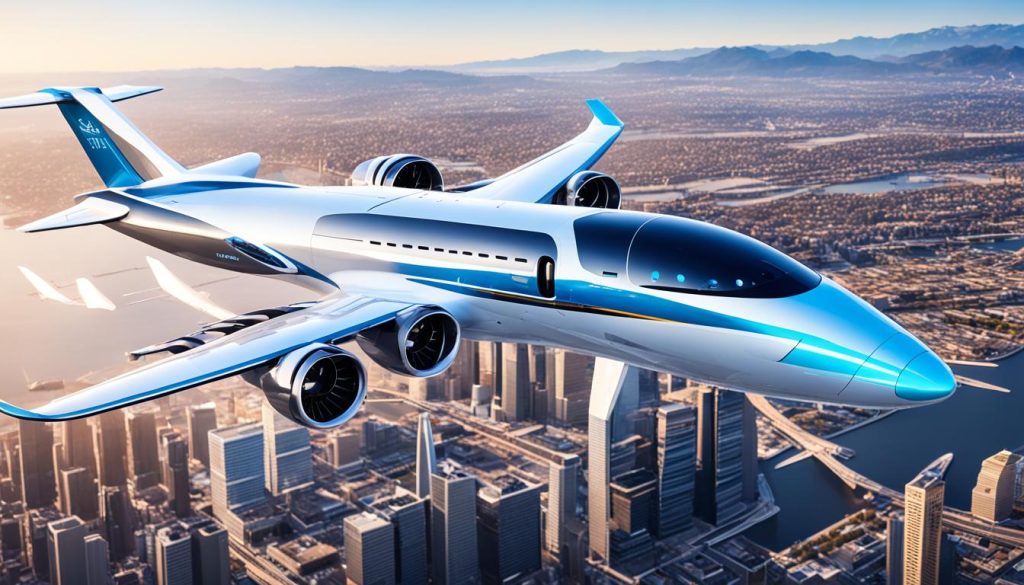
| Futuristic Possibilities | Benefits |
|---|---|
| Autonomous Aircraft | – Enhanced safety and precision – Increased operational efficiency – Reduced pilot workload |
| Personalized Experiences | – Higher customer satisfaction – Tailored services – Improved loyalty and retention |
| Virtual Assistants | – 24/7 support and guidance – Seamless passenger interactions – Enhanced convenience |
| Advancements in AI Technology | – Improved safety measures – Optimized operations – Sustainable and eco-friendly practices |
As we look towards the future, it is clear that artificial intelligence will play a pivotal role in shaping the aviation industry. From autonomous aircraft offering a new era of air travel to personalized experiences and AI-powered virtual assistants, the potential for innovation and transformative growth is immense. By harnessing the power of AI, the aviation industry can usher in a new era of efficiency, safety, and personalized journeys for passengers around the world.
The Impact of Artificial Intelligence in Transforming Industries
Artificial intelligence (AI) is not limited to the aviation industry; it is revolutionizing various sectors by improving operational efficiency and safety. The advancements in AI technology have profound implications for industries such as healthcare, finance, and more. However, the impact of AI in the aviation industry cannot be overlooked.
AI has played a crucial role in enhancing safety protocols within the aviation industry. By analyzing vast amounts of data, AI algorithms can identify potential risks and provide real-time insights for mitigating them. This proactive approach significantly improves overall safety measures, ensuring the well-being of both passengers and crew.
Furthermore, AI contributes to optimizing fuel consumption and reducing operational costs. Through intelligent algorithms, airlines can gain valuable insights into fuel efficiency and make data-driven decisions to minimize consumption. This not only leads to financial gains but also has a positive impact on the environment by reducing carbon emissions.
Operational efficiency is another area where AI makes a significant difference. By automating repetitive tasks and utilizing machine learning algorithms, AI systems streamline processes and improve productivity. This allows airlines to deliver better customer service, create seamless experiences, and meet the ever-increasing demands of the modern traveler.
The Role of AI in the Aviation Industry
AI plays a multifaceted role in the aviation industry, bringing about safety enhancements and operational efficiency. Some of the key areas where AI makes a significant impact include:
- Predictive maintenance: AI-powered systems monitor aircraft components and predict maintenance needs, reducing downtime and keeping the fleet in optimal condition.
- Autonomous systems: The development of autonomous aircraft has the potential to revolutionize air travel, ensuring greater safety, efficiency, and reliability.
- Real-time analytics: AI algorithms provide real-time data analysis, enabling airlines to make informed decisions, optimize operations, and improve overall performance.
- Personalized experiences: AI-powered technologies facilitate personalized interactions, allowing airlines to tailor services and recommendations to individual passenger preferences.
The transformative impact of AI in the aviation industry goes beyond financial gains. By augmenting safety measures, enhancing operational efficiency, and elevating customer service levels, AI is shaping the future of air travel.
In the aviation industry, AI has played a crucial role in enhancing safety protocols, optimizing fuel consumption, and elevating customer service levels.
| Benefits of AI in the Aviation Industry | Examples |
|---|---|
| Enhanced Safety Measures | AI algorithms analyze real-time data to predict and prevent potential risks, improving overall safety protocols in the aviation industry. |
| Operational Efficiency | AI-powered automation streamlines processes, reduces costs, and improves overall operational efficiency in airlines. |
| Optimized Fuel Consumption | AI algorithms provide valuable insights into fuel efficiency, allowing airlines to reduce consumption and lower carbon emissions. |
| Improved Customer Service | AI-powered systems enable personalized interactions, seamless experiences, and timely assistance for passengers, elevating the overall customer service levels. |
As the aviation industry continues to harness the power of AI, it paves the way for a future where safety, efficiency, and customer satisfaction are paramount. Artificial intelligence is driving the transformation of industries, and its impact on aviation is nothing short of revolutionary.
The Role of AI in Creating a Smarter Future
Artificial intelligence (AI) is at the forefront of technological advancements, driving the creation of a smarter future across various industries. The integration of intelligent systems and automation has revolutionized how businesses operate and make decisions. In the aviation sector, AI is playing a critical role in paving the way for safer skies, optimized operations, and enhanced customer experiences.
AI’s ability to process and analyze vast amounts of data is transforming traditional practices. Through advanced algorithms and machine learning, AI systems can extract valuable insights and patterns, enabling businesses to optimize processes, improve efficiency, and drive innovation.
In the aviation industry, AI and automation are bringing about substantial benefits. From the implementation of AI-driven predictive analytics to the deployment of autonomous systems, airlines are reaping the rewards of intelligent technological advancements.
Enhancing Safety and Efficiency
With the power of AI, aviation companies can analyze complex data sets to identify potential risks, make informed decisions, and optimize resource utilization. Predictive analytics algorithms enable proactive risk mitigation, helping airlines prevent potential disruptions and ensure smooth operations.
Furthermore, AI enables intelligent automation in various aspects of aviation operations, including air traffic management and maintenance. By embracing automation, airlines can achieve enhanced efficiency, reduced costs, and elevated safety standards. Automated systems can optimize flight paths, alleviate congestion, and minimize the risk of human error.
An example of AI’s impact is the integration of automated emergency response systems. These systems leverage real-time data and AI algorithms to facilitate quick and effective action during critical situations, further enhancing safety measures and passenger well-being.
Empowering Customer Experiences
AI technology is also reshaping the way customers engage with airlines, creating more personalized and seamless experiences. Chatbots and virtual assistants powered by AI provide 24/7 assistance, addressing customer queries and offering instant support. These intelligent systems can understand natural language, provide personalized recommendations, and streamline the entire customer journey.
Additionally, AI-driven automation simplifies the check-in process, enabling passengers to enjoy a smoother and more efficient experience. Self-service kiosks, biometric authentication, and facial recognition systems enhance convenience, reducing wait times and enhancing overall customer satisfaction.
By harnessing the power of AI, the aviation industry is revolutionizing how businesses operate and deliver services. From enhanced safety and operational efficiency to personalized experiences, the future powered by AI holds tremendous potential for a smarter, more intelligent world.

| Benefits of AI in Aviation | Examples |
|---|---|
| Enhanced safety measures | – AI-driven predictive analytics – Automated emergency response systems |
| Optimized operations | – AI-powered air traffic management – Predictive maintenance |
| Personalized customer experiences | – AI chatbots and virtual assistants – Seamless check-in processes |
This table illustrates the various benefits of AI in the aviation industry, showcasing real-world examples of how AI is transforming safety, operations, and customer experiences.
The Transformative Potential of AI in Aviation Safety
Artificial intelligence (AI) has emerged as a game-changer in the field of aviation safety, with its transformative potential to revolutionize safety measures and enhance risk mitigation strategies. By harnessing the power of predictive analytics and automated emergency response systems, AI offers a proactive approach to aviation safety, minimizing potential flight risks and ensuring swift action during critical situations.
Predictive analytics, bolstered by AI algorithms, enables aviation authorities to analyze vast amounts of data and identify patterns that can indicate potential risks. By leveraging this technology, airlines and aviation professionals can take preemptive measures to address emerging risks, significantly improving overall safety measures. From identifying potential technical failures through predictive maintenance to predicting adverse weather conditions and turbulence, AI empowers aviation professionals to make informed decisions and mitigate risks effectively.
In addition to predictive analytics, the automated emergency response systems powered by AI play a pivotal role in ensuring swift and effective action during critical situations. These systems are designed to quickly assess the severity of emergencies, automatically activating emergency protocols, and initiating appropriate response measures. Such automated systems reduce response time, providing a higher level of safety to passengers and crew members alike.
Efficient air traffic management is crucial to maintaining safe skies, minimizing congestion, and mitigating collision risks. AI plays an integral role in optimizing air traffic management and routing, ensuring seamless and efficient operations. By analyzing real-time data and predicting congestion patterns, AI-driven systems provide valuable insights that enable aviation authorities to make informed decisions for rerouting, reducing the likelihood of collisions, and enhancing overall safety measures.
The transformative potential of AI in aviation safety is undeniable. With its ability to harness the power of predictive analytics, automated emergency response systems, and optimized air traffic management, AI is poised to reshape the future of aviation safety. By leveraging this technology, aviation professionals can stay one step ahead of potential risks, enhance safety measures, and ensure the well-being of passengers and crew members.
Benefits of AI in Aviation Safety:
- Enhanced risk mitigation through predictive analytics
- Swift and automated emergency response during critical situations
- Optimized air traffic management for safer skies
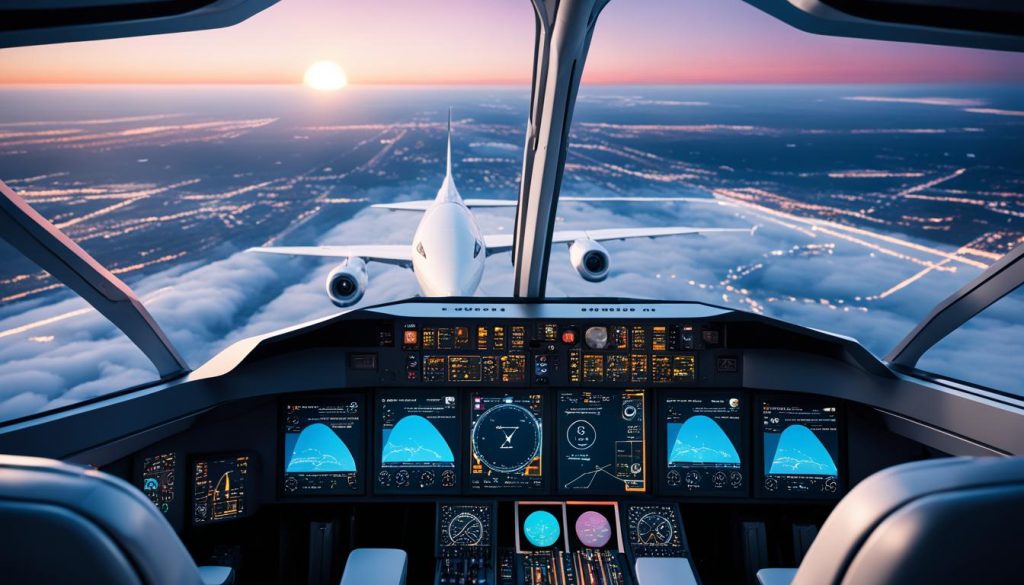
| AI Applications in Aviation Safety | Benefits |
|---|---|
| Predictive Analytics | – Identifies potential flight risks – Enables proactive risk mitigation strategies |
| Automated Emergency Response | – Swift and effective action during critical situations – Reduces response time and enhances safety |
| Optimized Air Traffic Management | – Minimizes congestion and collision risks – Ensures seamless and efficient operations |
The Future Landscape of Artificial Intelligence in Aviation
The future landscape of artificial intelligence (AI) in aviation is both promising and exciting. As technology continues to advance, it is anticipated that autonomous aircraft, personalized experiences, and enhanced safety measures will shape the industry, revolutionizing the way we travel. With AI-powered systems at the helm, journeys will become safer, more efficient, and more enjoyable.
Autonomous Aircraft: Redefining Air Travel
One of the most groundbreaking advancements on the horizon is the development of autonomous aircraft. These cutting-edge vehicles will redefine air travel by leveraging the capabilities of AI to operate without direct human intervention. Combining advanced sensor technology, machine learning algorithms, and real-time data analysis, autonomous aircraft have the potential to revolutionize the industry.
“Autonomous aircraft have the potential to transform air travel, making it more efficient, convenient, and sustainable,” says Dr. Lisa Carter, a leading expert in aviation technology.
By removing the limitations posed by human pilots, autonomous aircraft can optimize flight paths, reduce congestion, and increase fuel efficiency. These AI-powered vehicles have the potential to significantly enhance the overall safety of air travel by minimizing the risk of human errors and improving response times during emergencies.
Personalized Experiences: Enhancing Customer Satisfaction
Another key area where AI is expected to shape the future of aviation is in the creation of personalized experiences for travelers. Through AI-powered algorithms and machine learning, airlines can analyze vast quantities of data to understand individual preferences and tailor services accordingly.
From personalized in-flight entertainment recommendations to customized meal options, AI-driven systems can elevate the level of satisfaction and comfort for passengers. Virtual assistants, powered by AI, can provide real-time recommendations and assistance, ensuring a seamless and memorable travel experience.
Safety Enhancements: Reducing Risks and Improving Protocols
Safety is of paramount importance in the aviation industry, and AI has the potential to bring significant enhancements to safety protocols. AI-powered predictive analytics can analyze massive amounts of data to identify potential risks and mitigate them proactively.
Additionally, AI algorithms can optimize air traffic management, preventing mid-air collisions and reducing congestion. By harnessing the power of AI, airlines can continuously monitor flight operations, predict maintenance needs, and identify potential issues before they become critical, thereby ensuring the safety and reliability of their fleets.
| Benefits of AI in Aviation | Keywords |
|---|---|
| Enhanced safety measures | safety enhancements |
| Optimized flight paths | autonomous aircraft |
| Personalized travel experiences | personalized experiences |
| Improved response times during emergencies | autonomous aircraft |
| Reduced congestion and fuel consumption | autonomous aircraft |
The Transformative Potential of AI
The aerospace industry is on the cusp of a transformation driven by the power of AI. With ongoing advancements, the implementation of autonomous aircraft, personalized experiences, and safety enhancements will reshape the aviation landscape. This transformative potential of AI in aviation holds exciting prospects for the future, as the industry continues to innovate to meet the evolving needs of travelers around the world.
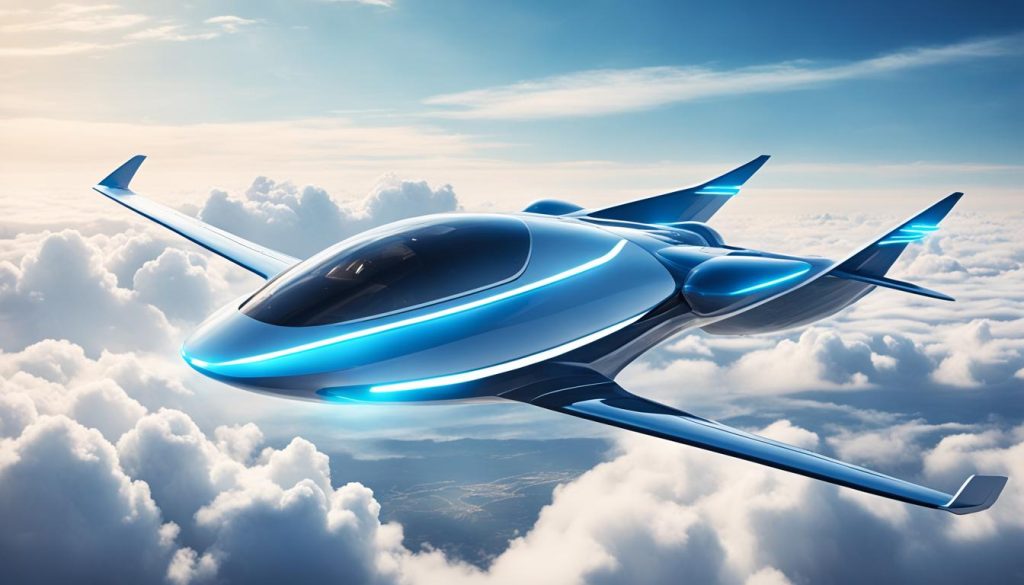
Conclusion
In conclusion, the integration of robotics and automation is transforming the luxury travel industry, aviation sector, and various other industries. The advancements in robotics technology, coupled with artificial intelligence, have revolutionized operations, enhanced safety measures, and elevated the overall customer experience.
As we look to the future, the implications of robotics and automation are boundless. From autonomous aircraft that offer unparalleled convenience and efficiency to personalized experiences that cater to individual preferences, the possibilities for innovation and growth are endless.
With ongoing technological advancements, the future promises a world where robotics and automation seamlessly blend cutting-edge technology with elegance and convenience in luxury travel experiences. This fusion of automation and robotics not only enhances efficiency but also ensures that the industry continues to evolve, adapt, and provide exceptional services to travelers.
As businesses continue to harness the power of automation and robotics, the future is bright with endless opportunities for innovation and growth. The transformative potential of automation and robotics technology is not limited to the luxury travel industry, as it extends to various sectors, shaping the way we live, work, and travel.
FAQ
How are robotics and automation transforming the luxury travel industry?
What role does artificial intelligence (AI) play in robotics and automation?
How is artificial intelligence enhancing safety and efficiency in the aviation industry?
How does artificial intelligence revolutionize the passenger experience in air travel?
How does artificial intelligence enhance aviation safety?
How does artificial intelligence optimize flight operations?
What are the future possibilities of artificial intelligence in aviation?
How is artificial intelligence transforming industries beyond aviation?
How is artificial intelligence creating a smarter future?
How does artificial intelligence transform aviation safety?
What does the future landscape of artificial intelligence in aviation look like?
Source Links




